University x USR Highlights
NCNU established the Shui Sha Lian Research Center for Humanities Innovation and Social Practice in 2013 to strengthen and practice university social responsibility (USR), build a communication platform for the university and local public groups, and develop a co-learning and co-working model. The center has made an overall plan for social responsibility practice and coordinated cross-functional communication. By setting up a dedicated task-type research center, this university hopes to lower the bar for faculty members in different areas of expertise to engage in the USR project. The organizational chart of NCNU’s USR practice is as follows:
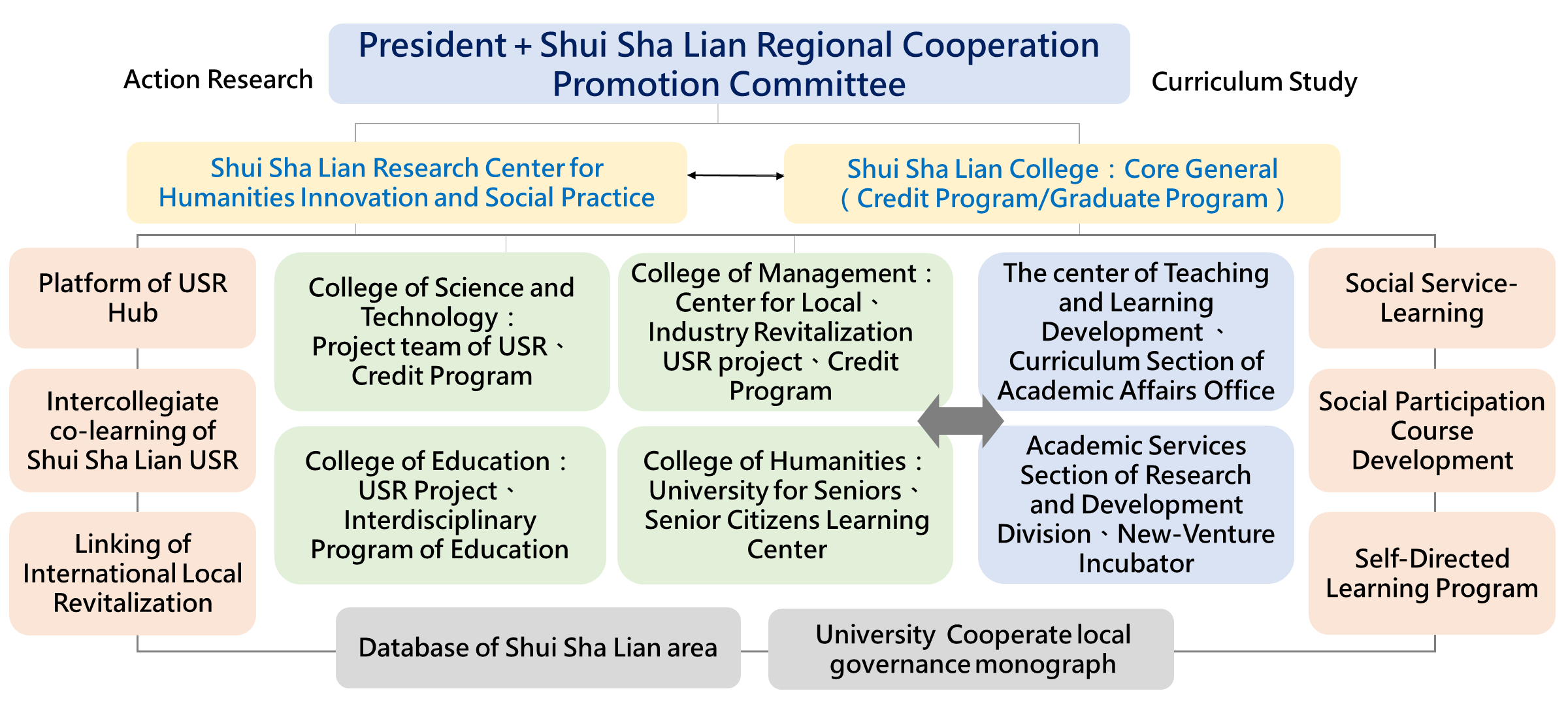
Achievements in the promotion of university affairs:
1. Practical talent retention system: Two assistant professors and two associate professors have been promoted via the “industry-academia application approach” since NCNU revised and adopted multiple approaches to faculty promotion.
2. Positive training system: NCNU has cultivated 15 postdoctoral research fellows (including contract-based teachers). Seven of them have been promoted to contract-based assistant professor and four of them to assistant professor (one represents the Department of Public Policy and Administration and three represent the General Education Center).
3. A friendly co-learning atmosphere for faculty communities: The number of applications and participation rate grew from 42 and 40.89% in 2018 to 73 and over 60% in 2021, respectively, which is a testimony to the growing teaching communities. By building the cross-functional Professional Faculty Learning Community, members can encourage each other to improve their professional teaching skills and innovative teaching strategies.
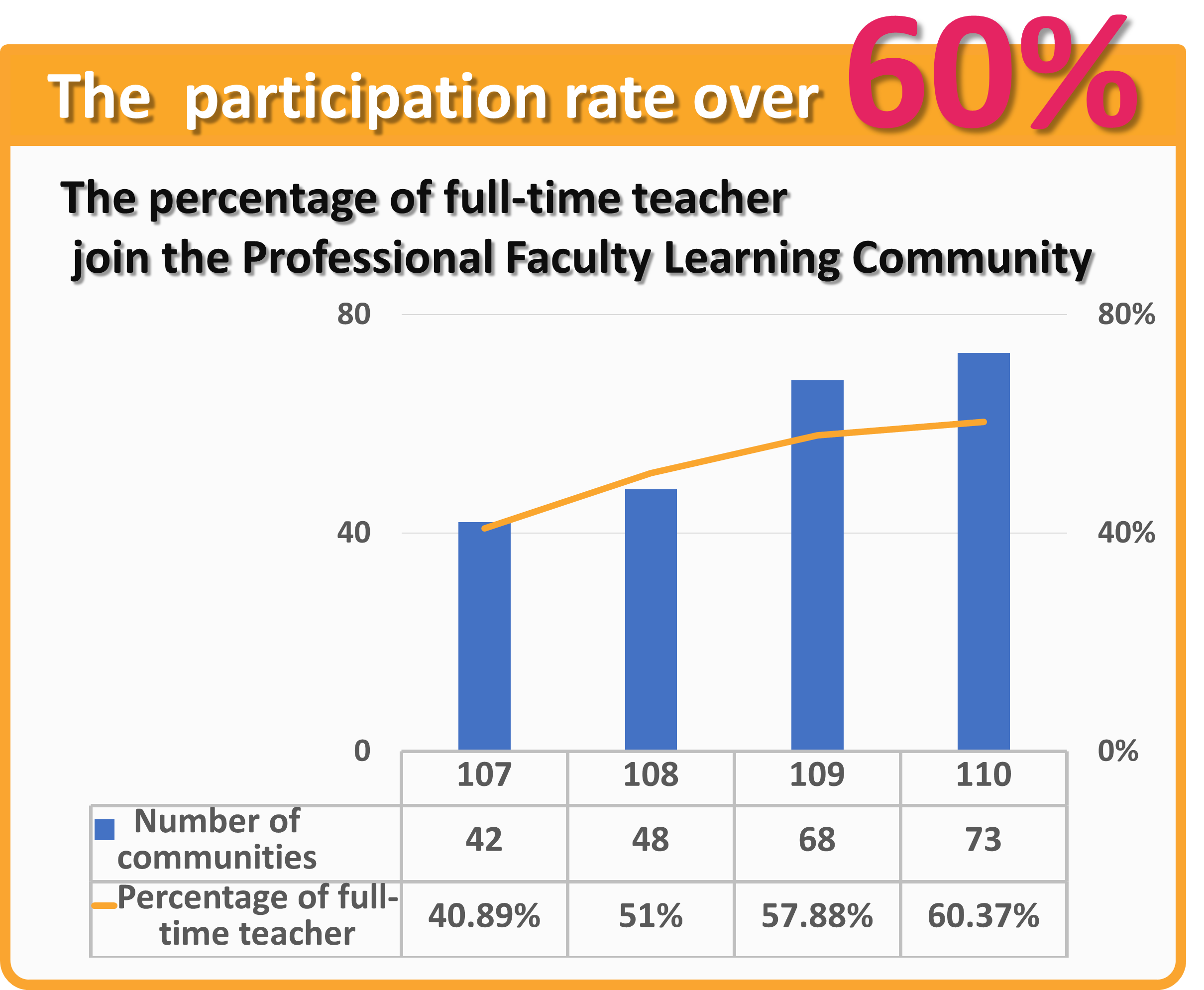
4. Practical teaching model: NCNU has implemented social participation courses and developed a model in which the university and local communities can learn from and work with each other. Action items include environmental education, tribal governance, disaster prevention in daily life, and ecological conservation. Cumulatively 95 courses were offered from 2018 to 2021 and attended by 2,670 people.
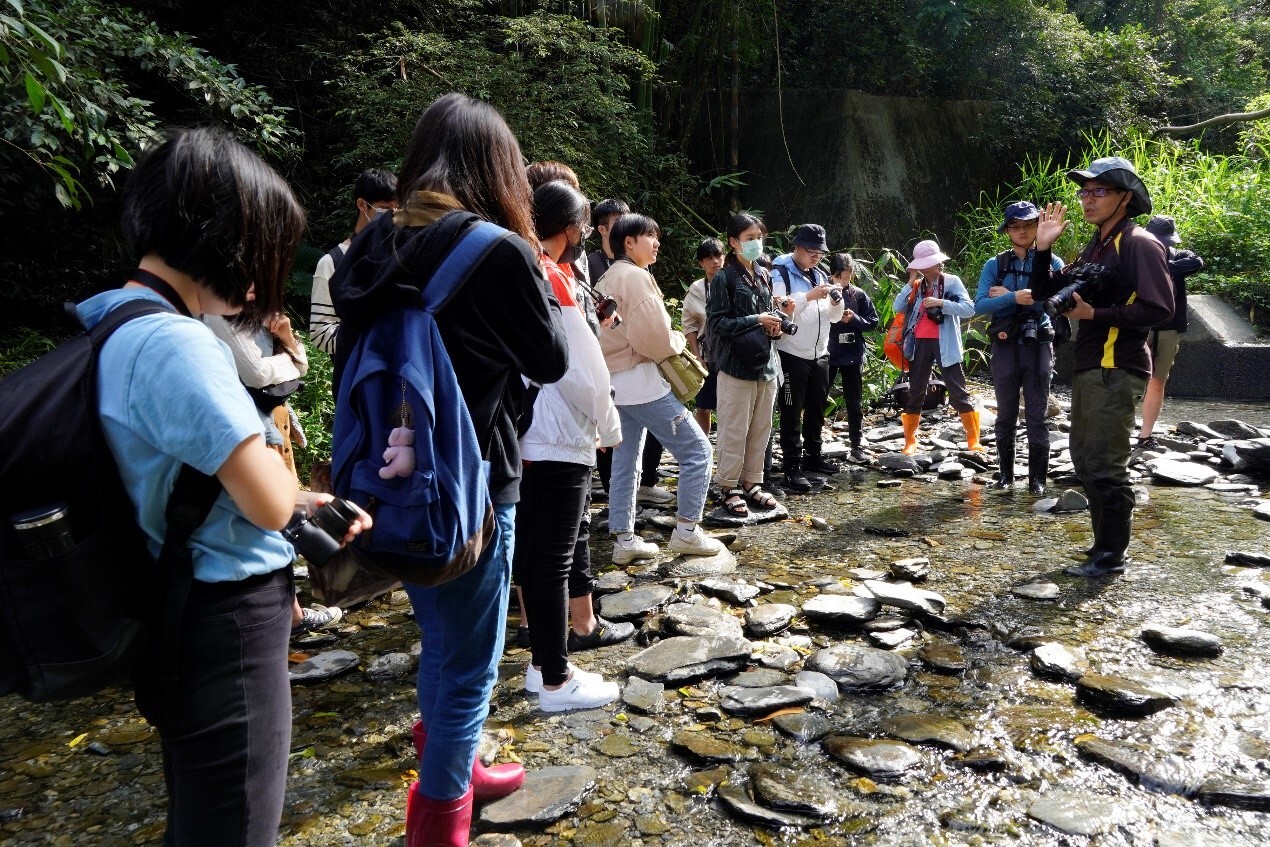
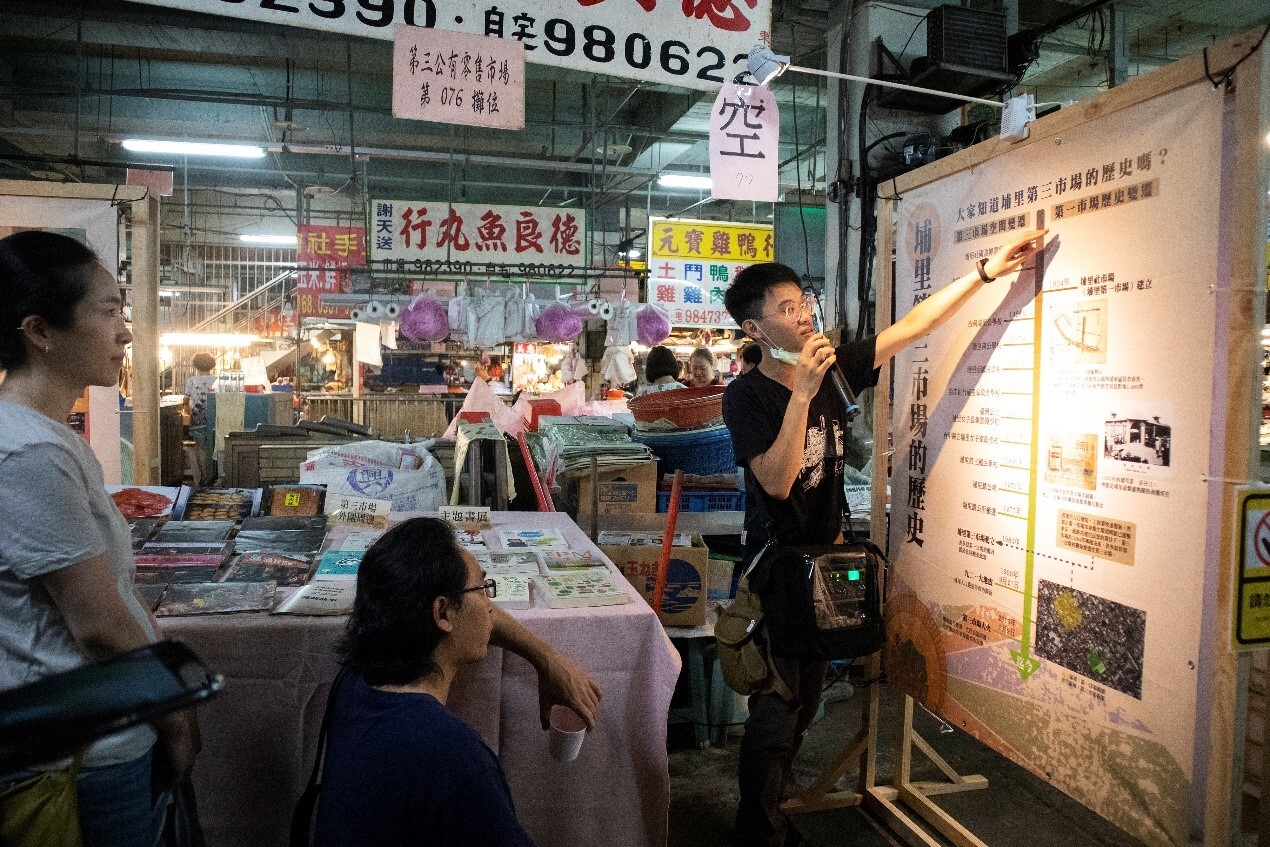
5. Establishing feature programs that correspond to local development: NCNU has planned the Returning Youth Innovation Practice Credit Program, Local Industry and Rural Development Credit Program, as well as Sustainable Environmental Management Credit Program and Microprogram to cultivate action-oriented human resources in social practice.
6. Making social practice-based learning ecosystems more complete: NCNU established the Shui Sha Lian College as well as Placemaking and Cross-boundary Governance Master’s Program in 2021. They serve as an extended learning channel for social service-learning courses to enhance NCNU’s capability in regional research and education while cultivating talent in social action for rural development and regional revitalization in Taiwan.
7. Running the joint office of regional revitalization and cross-boundary governance; accompanying and collaborating with local-practice action groups: NCNU has set up four USR Hub groups, in addition to providing consultation and support to the USR group during the practice process.
Building the Shui Sha Lian “ageless, long-term caring” collaborative governance network: NCNU has created a localized care model featuring symbiotic communities, with its coverage rate reaching 52.63%. It has also invested in the development of smart care and developed the nation’s first community care-based app information system.
Cultivating talent in Shui Sha Lian regional revitalization and placemaking: NCNU has offered a course titled “Shui Sha Lian Regional Revitalization and Placemaking Research Academy”, assisted township officers in acquiring related basic knowledge, and helped township and local public communities build a collaborative network to create a new public governance model.
Cultivating talent in local micro-entrepreneurship and industrial innovation: NCNU has conducted a “Survey on the Willingness of Local Micro-enterprises to Engage in Digital Transformation During the Pandemic”, launched a digital learning program titled “Hometown Cloud”, and matched up information management teams to introduce the planning of revitalization activities and establishment of a regional e-commerce platform using digital tools.
Promoting volunteer empowerment and education on improvement of air quality in Nantou: NCNU has led students to jointly create a picture book titled Moonlight Festival in Afute Village and online teaching materials, brought community universities together to empower local volunteer groups, employed diverse teaching materials to promote environmental education, enhanced public awareness of air pollution, and promoted civic behavior.
8. Higher education SPROUT and placemaking projects: NCNU has invited important local public and private communities since 2016 to form the Shui Sha Lian Regional Cooperation Promotion Committee. The committee reviews local development issues and needs on a regular basis, brings faculty and student groups at the university together to collaborate and work with each other, and plays the role of an action-oriented think tank for the local government. Meanwhile, NCNU has signed an agreement on the Alliance for Promotion of Placemaking Strategies with the Puli Township Office, Guoxing Township Office, and Renai Township Office respectively to help them establish placemaking promotion committees and task forces, whereby they jointly developed a vision for future local development and their entrepreneurial placemaking proposals have been successfully approved.
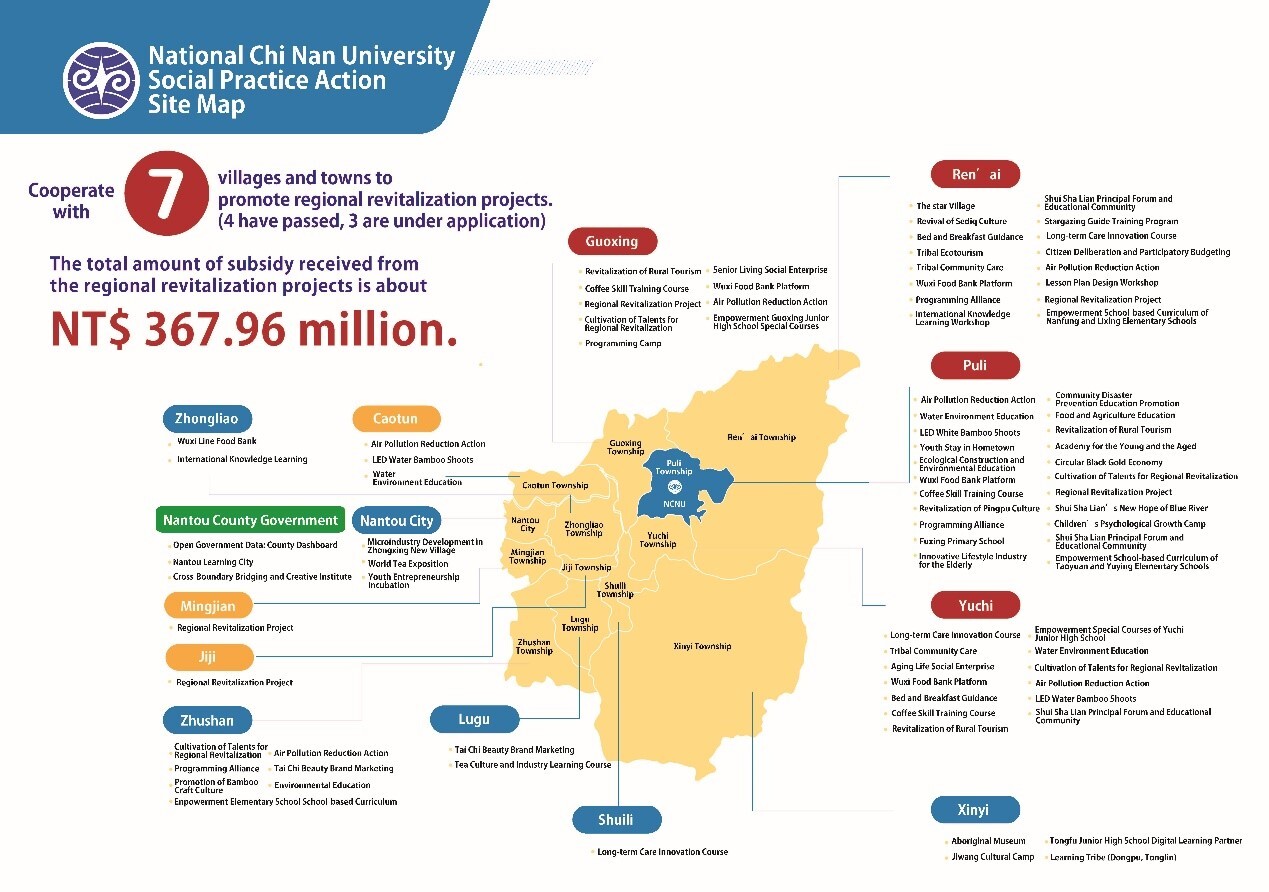
9. Local practice, international connection: NCNU has worked with schools with excellent experience in promoting the University Center of Community (COC) and COC+ projects in Japan on co-learning design of university social responsibility plans. It has also actively participated in the Taiwan-Japan Alliance of Local Revitalization and Social Practice, contributing to the bilateral exchange of academic and practice experience. President Dong-Sing Wuu of NCNU was recommended by representatives of the alliance to serve as its first chairman from September 2022 onwards.
10. Initiation and development of Shui Sha Lian Studies: NCNU analyzes the academic content of Shui Sha Lian Studies concerning local development involving collaboration from the university via the design of action research and accumulation of experience in local practice. It also proposes dynamic practice theory and methods for Shui Sha Lian Studies, offering a new academic paradigm of local development involving collaboration from universities. NCNU has published a book series, including Bridging University and Country Governance, Action, and Research and Constructing Shui Sha Lian Studies: Action Research on NCNU Humanities Innovation and Social Practice. It also publishes the NCNU Social Practice Results Report every year.
To deepen the majors of each college to respond to local development issues, the five colleges of our school continue to invest in various issues in the Nantou area, such as "local characteristic industries, water environment creation, care for children in rural areas, community long-term care systems, and air pollution control".
